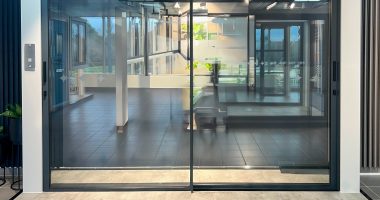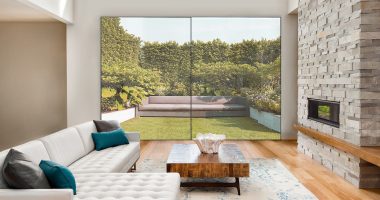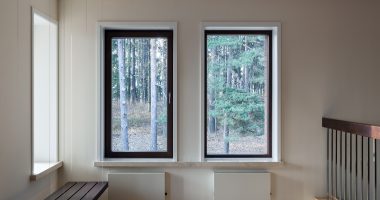Frameless doors and windows, a diverse range of glazing products, are designed to flood your home with natural light. Whether you’re after a contemporary, minimalist look or simply want to maximize the amount of light in your living space, these products offer a variety of solutions. Here, we answer some of the most frequently asked questions about frameless doors, windows, and other glazing.

Are frameless doors and windows really frameless?
No glass is completley frameless. All types of frameless glazing need suitable structural fixing, whether with a frame or other structural fixings. Examples include hidden fixings, recessed and hidden frames, patch fittings or brackets.
It’s important to note that all sliding and bifolding doors require a frame. This frame is essential for the locking systems, track, sealing, and security. Therefore, there is no 100% frameless system. However, with the right design, such as hiding the door frames into the structure, you can achieve a minimal frame appearance, enhancing the aesthetics of the installation.
How good are frameless doors?
They are ‘good’ if they are sold to you correctly as suitable for your project. Do your research as some products are marketed as frameless when they are not. Ensure they meet security and building regulations required for their location (internal and external). Weather performance is also an important consideration. You can also get in touch with us for advice.
Considering there is no fully frameless system, your options are bifolding doors with the slimmest mullion sightlines and sliding or slide-and-turn systems. Beware, some frameless doors are only single-glazed and intended for outside canopies, verandas, or internal use. They are not suitable for exterior glazing and patio doors.
Why are frameless doors and windows more expensive?
You would assume that the less aluminium in a product, the cheaper it would be! However, frameless glazing is usually more expensive (beware if it is not!)
One reason frameless aluminium doors and windows are more expensive than regular aluminium-framed versions is that the manufacturing process is more complicated. These products are largely made around the glass in the factory, whereas aluminium doors and windows are manufactured ‘unglazed’, and the glass is installed on-site. Therefore, the supplier/installer buying these products to sell is paying a markup on the glass that they would typically buy directly and install in the frames themselves.
Another reason for the price differences is that the fitting and transportation of fully glazed products are more complicated, often requiring special machines and more labour on-site to handle the heavier products.
Prices on home improvement products vary considerably from company to company, even for the same brand, so it is always worth getting at least three quotations and comparing the product specifications to ensure the prices are like-for-like.
What are the advantages of frameless doors and windows?
An all-glass appearance, a minimalist look and maximising views are just three advantages of having frameless doors and windows in your home. For doors especially, no standard sliding or bifolding door can offer the same uninterrupted views as a frameless product.
A disadvantage of these products is their greater complexity should there be a fault in the future, especially if the glass units fail or break. It’s unlikely a regular glazier will want to work with frameless doors. Therefore, choose your installer and brand carefully for ongoing service.
What types of frameless glazing products are available?
Your choice of frameless products will depend on where they are to be located and building regulations. Typical products include:
– Frameless opening and fixed, apex and gable windows and rooflights
– Frameless bifolding, sliding, slide-and-turn doors
– Internal glass doors and screens
– Frameless glazed extensions, porches, swimming pool/Jacuzzi enclosure
– Single glazed glass garden rooms, porches, swimming pool/Jacuzzi enclosure
– Glass floors, staircases and balustrades
– Kitchen glass worktops and splashbacks
How big can a frameless window be?
It depends. The following technical considerations must be taken into account:
– The maximum size of glass the glass manufacturer can handle, toughen and laminate.
– The maximum size of glass the product has been designed for
– The forces of wind and the deflection on the glass
– Transportation constraints
– The maximum opening size allowed for your structure
Is frameless glazing safe?
Absolutely. Blackpool Tower, for example, has a glass floor at the top of the tower that you can stand on. There are also frameless rooflights called ‘walk-on glass’. Even glass staircases project out from the wall in a floating design with no apparent support. Frameless products use laminated, toughened or very thick glass in multiple layers. This kind of glass is designed with strength and structural integrity.
Frameless doors and windows are designed and made around the glass, which is the structural component of the overall product. So, any correctly designed and tested frameless door, window, or screen should be fit for purpose. Of course, there are many British and European standards relating to glass safety.
Can you have integral blinds in a frameless door?
In most cases it’s not possible to have integral blinds in doors that are frameless with exposed glass edges.
How long will frameless doors and windows last?
There are many different manufacturers of frameless doors and windows with various guarantees. Many products come with a 10-year guarantee and with more extended warranty periods on the powder coating of any aluminium frames.
As frameless doors and windows are relatively new in the UK, it is hard to comment on their long-term performance over two or three decades. That said, there is no reason why a frameless product with quality glass, quality manufacturing, and a good installation should not provide many years of reliable service.
Ask your installer for specific information about how the product should perform in the long term. However, just like any consumer product, over the years, they are improved and superseded, and some are discontinued altogether. Internal products like doors, screens, and splashbacks should last a very long time.
Are external frameless doors and windows energy efficient?
It is important to know that frameless doors and windows benefit from the best glass technology, manufacturing, coatings, and components.
Single-glazed frameless products are excluded from any energy efficiency. Double or triple-glazed frameless products have very good U-Values on the glass units. Just like a full-framed PVCu or aluminium window and door, the glass is the primary component that contributes the most to the overall energy efficiency and U-Values.
Your installer should provide full details, but as a general guide, frameless products for external use meet or exceed current Building Regulations for thermal efficiency.
Is there a lot of solar gain from frameless doors and windows?
For a residential or commercial setting, you need to consider privacy, shading, and all-around comfort on hot and cold days when choosing doors and windows. Frameless doors and windows have no higher solar gain than standard framed doors and windows.
For privacy, you may need to consider blinds. If you don’t want open blinds visible, some fall from your ceiling and disappear from sight when opened. There is even switchable smart glass that changes from clear to obscure at the flick of a switch.
Most professional glass suppliers try to address the issue of solar gain with solar control glazing, and your supplier should advise you on the likely solar gain from a large glass door or picture window.
If you would like some personal advice regarding your particular project, please get in touch with your questions.

Latest articles
- Buying windows and doors online – think twice July 4, 2025
- Where Can You Get Planning Advice? April 5, 2025
- Do You Need Planning Permission For A Porch? April 2, 2025
- Do You Need Planning Permission For A Conservatory? April 2, 2025
- Planning Permission for Windows: What Homeowners Need to Know March 31, 2025






